NOT RECOMMENDED
A quartet of stellar performers, a gifted composer/musical director, and L.A.’s costume designer du jour at his most over-the-top fabulous can’t, unfortunately, save the Oscar Wilde-based World Premiere musical Dorian’s Descent from descending into three hours’ worth of clichéd dialog and lyrics, jarring tonal shifts, and good intentions gone disastrously bad.
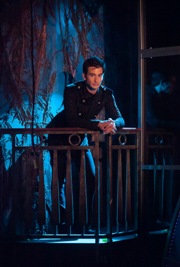 To begin with, Wilde’s The Picture Of Dorian Gray hardly needed another musicalization. Wikipedia lists at least six previous English-language Dorian Gray musicals over the past fourteen years without even mentioning the terrific Dorian that played the NoHo Arts Center a decade ago with Wilde’s tale transported to late 20th Century New Orleans. Thus, it’s not really clear why DOMA Theatre Company even considered creating yet another Dorian The Musical, an ill-advised adaptation that ends up adding nothing new to Wilde’s tale save Chris Raymond’s prodigious musical talents and some terrific singers doing their darnedest to make lemonade out of a lemon.
To begin with, Wilde’s The Picture Of Dorian Gray hardly needed another musicalization. Wikipedia lists at least six previous English-language Dorian Gray musicals over the past fourteen years without even mentioning the terrific Dorian that played the NoHo Arts Center a decade ago with Wilde’s tale transported to late 20th Century New Orleans. Thus, it’s not really clear why DOMA Theatre Company even considered creating yet another Dorian The Musical, an ill-advised adaptation that ends up adding nothing new to Wilde’s tale save Chris Raymond’s prodigious musical talents and some terrific singers doing their darnedest to make lemonade out of a lemon.
“Endless Charade,” Dorian’s Descent’s attention-getting opening production number, introduces us to our handsome, wide-eyed hero (the gorgeous Michael D’Elia) and the first of Michael Mullen’s dazzling array of costumes.
Then plot takes over and trepidation begins to set in that this latest Picture Of Dorian Gray may not live up to expectations set by director Marco Gomez’s triumphant 2013 Dreamgirls revival, or even the director’s less successful but still strikingly staged Jekyll & Hyde the year before.
To begin with, though Kelly Brighton (as Henry Wotton) and Jeremy Saje (as Basil Hallward) are both strong singers, the same cannot be said about them as actors, Brighton reciting Wildean witticisms without an iota of Wilde’s good humor and Saje giving line readings at best, deficiencies that would matter less were the roles of Dorian Gray’s discoverer/champion and the painter whose portrait inspires Wilde’s original title not so vital in involving us in Dorian’s diabolic deal.
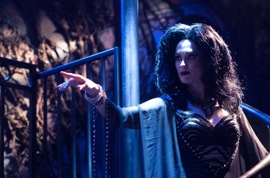 The stunning Toni Smith brings to life Sofia, aka The Demon who offers Dorian Gray said Deal With The Devil, one inspired by the handsome young man-about-town’s superficial desire to remain ever young and beautiful.
The stunning Toni Smith brings to life Sofia, aka The Demon who offers Dorian Gray said Deal With The Devil, one inspired by the handsome young man-about-town’s superficial desire to remain ever young and beautiful.
Her stroke of demonic genius?
As anyone who’s read The Picture Of Dorian Gray or seen any of its umpteen stage and/or screen adaptations can tell you, it is Basil’s painting of Dorian, hidden in the dark recesses of an attic closet, that will grow old and ugly while Dorian himself stays younger than springtime and fresh as a daisy in May.
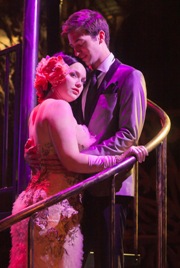 Meanwhile over at Club Zodiac, our as-yet still relatively purehearted (and apparently still virginal) hero takes one look at—and listen to—curvaceous chanteuse Sibyl Vane (a ravishing Cassandra Nuss) and falls head over heels with her beauty and talent—though not necessarily in that order, as we learn when poor Sibyl, who’s been pushed into showbiz by Mommy Dearest Margaret (Michelle Holmes in Faye Dunaway mode), decides that all she needs for happiness is her man.
Meanwhile over at Club Zodiac, our as-yet still relatively purehearted (and apparently still virginal) hero takes one look at—and listen to—curvaceous chanteuse Sibyl Vane (a ravishing Cassandra Nuss) and falls head over heels with her beauty and talent—though not necessarily in that order, as we learn when poor Sibyl, who’s been pushed into showbiz by Mommy Dearest Margaret (Michelle Holmes in Faye Dunaway mode), decides that all she needs for happiness is her man.
The consequences on young love are disastrous.
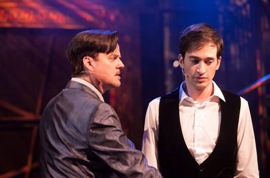 It’s about here that Dorian’s Descent crosses the point of no return, for in a plot twist that might not have been ludicrous when Oscar Wilde first wrote it (or something like it), Sibyl’s deliberately botched tryout for the music impresario Dorian has brought to the Zodiac to sign his now fiancée to a record deal causes hitherto nice guy Dorian to reject poor Sibyl in the cruelest way possible, a transformation from human to heartless (“The Breakup”) so out-of-the-blue that it defies credulity—and takes away Sibyl’s sole raison d’être: her man.
It’s about here that Dorian’s Descent crosses the point of no return, for in a plot twist that might not have been ludicrous when Oscar Wilde first wrote it (or something like it), Sibyl’s deliberately botched tryout for the music impresario Dorian has brought to the Zodiac to sign his now fiancée to a record deal causes hitherto nice guy Dorian to reject poor Sibyl in the cruelest way possible, a transformation from human to heartless (“The Breakup”) so out-of-the-blue that it defies credulity—and takes away Sibyl’s sole raison d’être: her man.
Equally credibility-defying is Henry’s response to Dorian’s attack of the guilts at Sibyl’s subsequent suicide. In a moment that would make Book Of Mormon’s Elder McKinley proud, Dorian’s just-plain-nasty mentor advises his bereft mentee to “turn it off” (like a light switch?) and get on with his descent into depravity by switching from the relatively tame Club Zodiac to the considerably edgier Club 11-11.
It’s at this point that the till-now unwaveringly hetero Dorian discovers bisexuality, and so too does Dorian’s Descent, or kind of, for no matter how gay just about every one of its male supporting cast may read, the musical’s couplings (with the exception of a lesbian background pair or two) have been—and pretty much continue to be—resolutely Focus On The Family-friendly boy-girl.
Twenty years pass, and as promised by The Demon, Dorian doesn’t age a day, though the same can’t be said for the increasingly ancient-looking painting still tucked away in the closet (even if our hero has kinda-sorta come out of his).
It’s round about now that a pair of characters become significant in Dorian’s life.
One is sweet-young-thing Madeline Hallward (the Amy Adams-esque Lauren Hill), the late Basil’s painter niece with whom our now villainous hero becomes infatuated, and she for some unfathomable reason with him.
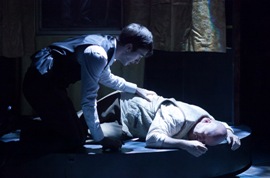 (Did I neglect to mention that the unfortunate Basil did some suiciding of his own when his bromantic feelings for Dorian got ignored? Oops. He did.)
(Did I neglect to mention that the unfortunate Basil did some suiciding of his own when his bromantic feelings for Dorian got ignored? Oops. He did.)
The other new arrival in Dorian’s life is the late Sibyl’s military vet brother James (hunky Tony Graham), still bereft about his sister’s suicide and eager for a revenge he would unhesitatingly take if the still 20ish-looking Dorian weren’t too convincingly fresh-and-young to have been but a baby back then.
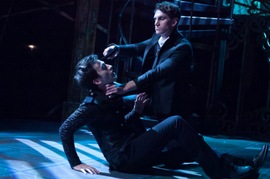 Anyone who thinks all this can possibly end Happily Ever After hasn’t read his Oscar Wilde, or seen Dorian Gray on the large-or-small screen or on the legitimate stage, though in Dorian’s Descent, even dead Dorian stays as young as ever, which kind of misses the whole point. (Picture old, Dorian young. Picture young, Dorian old.)
Anyone who thinks all this can possibly end Happily Ever After hasn’t read his Oscar Wilde, or seen Dorian Gray on the large-or-small screen or on the legitimate stage, though in Dorian’s Descent, even dead Dorian stays as young as ever, which kind of misses the whole point. (Picture old, Dorian young. Picture young, Dorian old.)
For the most part, book writers Gomez, Michael Gray, and Raymond (and lyricists Gomez and Raymond) play it deadly serious, as do most cast members, the notable exception being a pair of unfortunate scenes, the first involving a couple of wise-cracking handymen and the second a twosome of flaming night-clubbers, both scenes straight out of a bad community-access cable sketch comedy show. In either case, the stifled audience laughter that increasingly accompanies Dorian’s Descent surely is not what the writers were going for here.
All this is a shame, since D’Elia, Nuss, Hill, and Smith are four stellar performers, each one gifted with splendid pipes and all of them deserving of material at the level of their talents.
At the very least, Dorian’s Descent has one big thing going for it. Two-time Scenie-winning Musical Director Of The Year Raymond not only gets top marks for doing his m.d. thing. In song after song he proves himself a pop composer to be reckoned with, and never more so than in Act Two’s “Wicked Dream,” “Open Up Your Heart,” and “Someone Else When You’re With Me.”
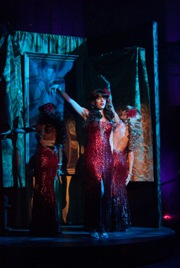
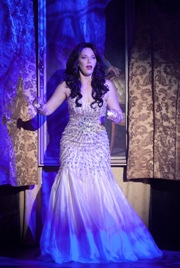
The Dreamgirls-esque “Baby, Let’s Fall In Love” has hit potential as well, as does “Sparrow.” In fact, composer Raymond’s only misstep is in writing some higher-than-high notes that strain even the finest of Dorian’s Descent’s vocalists. Raymond’s orchestrations, on the other hand, deserve an unqualified thumbs-up.
The other big thing in Dorian’s Descent’s favor are Mullen’s costumes, each more glittery and glitzy and glamorous and gorgeous than the next.
Jean-Yves Tessier’s lighting design is pretty spectacular too, sound designer Julie Ferrin insures a perfect mix of amped vocals and live instrumentals, and Allison Schenker gets thumbs up for her props design. John Iacovelli’s scenic design would be a winner too if certain audience members didn’t find their sightlines of balcony and portrait blocked. Karen Sanchez gets high marks for her glamour makeup, though a two-decades-older James doesn’t look 40something so much as sleep deprived.
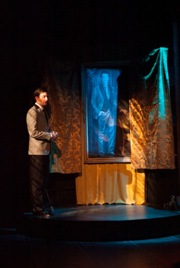 Painter Ruth Gilmore’s Picture Of Dorian Gray would be just fine were characters not repeatedly gushing over it as a masterpiece, which it is not. Choreographer Tania Possick has come up with some watchable dance sequences to perk up audience attention.
Painter Ruth Gilmore’s Picture Of Dorian Gray would be just fine were characters not repeatedly gushing over it as a masterpiece, which it is not. Choreographer Tania Possick has come up with some watchable dance sequences to perk up audience attention.
Cast members give it their all, though like principal players, Johanna Rose Burwell, Kevin Corsini, Robert Glen Decker, Andrew Diego, Anthony Dooley, Jillian Easton, Kia Dawn Fulton, dance captain Susan Huckle, Michael Liles, Garret Riley, Jenny Torgerson, dance captain Tiffany Williams, and Lindsay Zana deserve better material.
There can be no complaints whatsoever about Dorian’s Descent’s sensational orchestra—conductor Raymond on piano, synthesizer programmer Yuhong Ng on keyboard 2, Antonio Rodrigo on bass, Logan Shrewsbury on drums/percussion, Tom Luer and Steve Clothier on reeds, and James Blackwell on trumpet.
Dorian’s Descent is produced by Mike Abramson, Dolf Ramos, and Raymond. Gomez is executive producer. Amy Francis Schott is associate producer. Gabrieal Griego is production manager/stage manager and Liza Miranda assistant stage manager. Aaron Lyons is technical director. Casting is by Peter Matyas.
Opening Night audiences are generally as enthusiastic as theatergoers get, which makes the muted applause that greeted even last night’s finest-performed musical numbers all the more noteworthy and disheartening.
Briefly put, it’s hard to cheer even the best performers when the show they’re in is as mediocre and misguided as Dorian’s Descent.
DOMA Theatre Co. @ The MET Theatre, 1089 N. Oxford Ave., Hollywood. T
www.domatheatre.com
–Steven Stanley
May 30, 2014
Photos: Silvia Spross
Tags: DOMA Theatre Company, Los Angeles Theater Review, Oscar Wilder, The Picture Of Dorian Gray


 Since 2007, Steven Stanley's StageSceneLA.com has spotlighted the best in Southern California theater via reviews, interviews, and its annual StageSceneLA Scenies.
Since 2007, Steven Stanley's StageSceneLA.com has spotlighted the best in Southern California theater via reviews, interviews, and its annual StageSceneLA Scenies.







 COPYRIGHT 2024 STEVEN STANLEY :: DESIGN BY
COPYRIGHT 2024 STEVEN STANLEY :: DESIGN BY